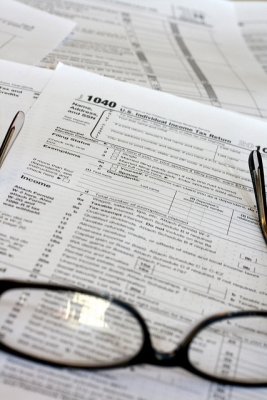Taking a Tax Deduction For Donating To Charities

For American taxpayers who itemize their deductions, taking a tax deduction for donating to charities is one of the most often forgotten items each year. Quite often taxpayers forget to keep records of their charitable contributions during the tax year, but that doesn't necessarily mean that you can't increase your refund or decrease your tax liability by taking a tax deduction for donating to charities.
For instance, if you donated home furnishings, clothing, appliances, equipment or other goods to a charity during the tax year, you can deduct up to $500 without having to fill out the sections of form 8283 that pertain to the date and how you acquired the property, etc. Basically all you need for taking a tax deduction for donating to charities under $500 are a simple description of the donated property, what organization you donated it to, and the value. For donations over $500, you will need the date of acquisition and how the property was acquired as well.
Automobiles can be an excellent item for taking a tax deduction for donating to charities. If you have a vehicle that is really not worth trying to sell and you no longer need it, donating it to a charity could be your best option. Remember, giving it to your son-in-law is not a charitable contribution although it may seem that way. In order for you to take a tax deduction, you must donate it to a non-profit organization, which could be your church or any other bonafide charity that accepts vehicles as donations. The amount that you deduct on your tax return should be the Blue Book value, which you can acquire online at the Kelly Blue Book website. You should definitely not try to deduct the original value or sticker price of the vehicle. You'd be surprised how many people make that mistake, which can trigger an IRS audit.
When it comes to taking a tax deduction for donating to charities that involve cash, hopefully you remembered during the tax year to pay by check or credit card, so that you can simply go back through your financial records for the year. Most churches will send you a statement at the end of the year for your giving, so those donations should not be a problem. Other cash donations, even though you may not have a cancelled check, statement or receipt can still be deducted if you remember where and when you made the donations and they are not exorbitant.
Sometimes taking a tax deduction for donating to charities is abused by certain unethical taxpayers, so be cautious about any deductions that you take on your return for which you do not have a clear paper trail for verification purposes. Next year, make sure you make your donations via check, debit or credit card, or Paypal. If you donate goods or services, make sure you get a receipt and calculate the donation value correctly. Smart taxpayers know that taking a tax deduction for donating to charities is fairly lucrative and that their donation helps the non-profit organization, but also benefits their bottom line as well.
